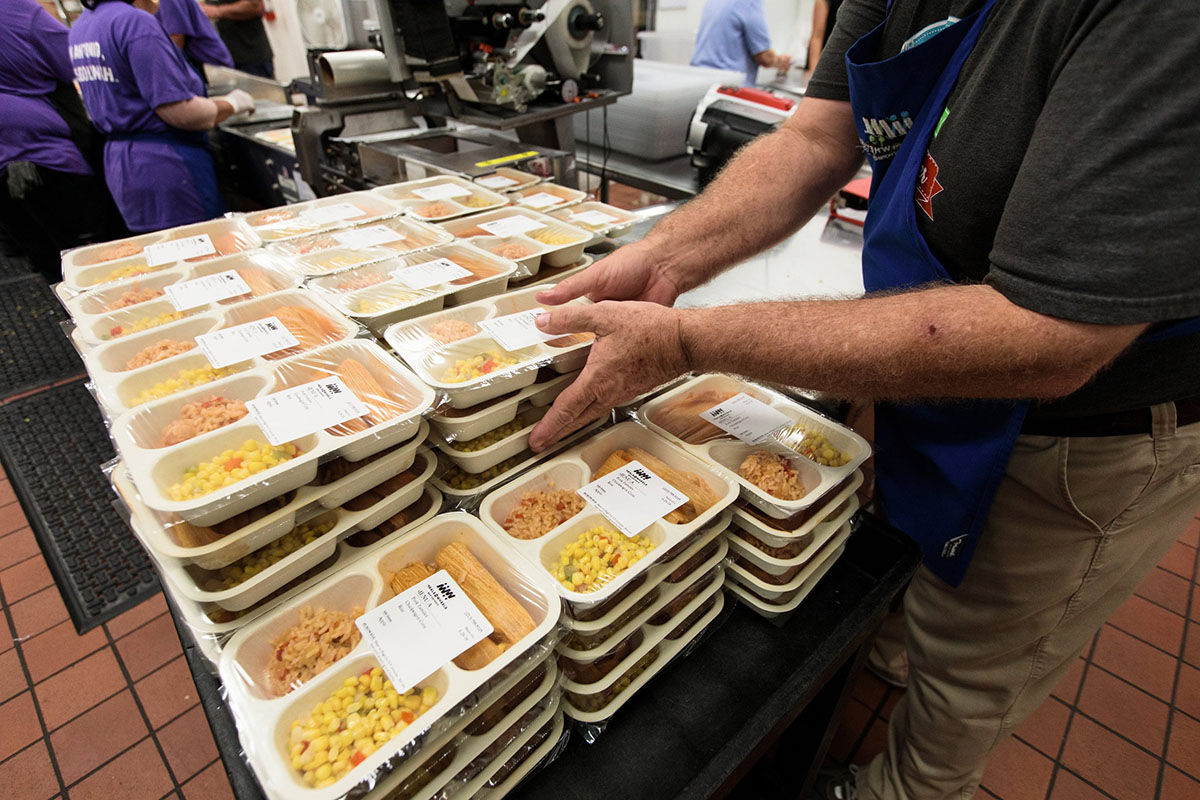Home>Finance>How Much Federal Funding Does Meals On Wheels Get


Finance
How Much Federal Funding Does Meals On Wheels Get
Published: December 22, 2023
Discover how Meals On Wheels receives federal funding and learn about the finance behind this important program. Find out how much financial support is provided to ensure seniors receive nutritious meals.
(Many of the links in this article redirect to a specific reviewed product. Your purchase of these products through affiliate links helps to generate commission for LiveWell, at no extra cost. Learn more)
Table of Contents
Introduction
Meals On Wheels is a vital program that delivers nutritious meals to vulnerable individuals, primarily senior citizens, who are unable to prepare their own meals. This program not only addresses the nutritional needs of these individuals but also serves as a lifeline, providing social interaction and wellness checks to combat loneliness and isolation. Meals On Wheels relies on funding from various sources, including federal support, to ensure its continued operation and reach.
In this article, we will explore the importance of federal funding for Meals On Wheels and how it plays a crucial role in sustaining this valuable program. We will delve into the current level of federal funding, the impact of funding cuts, and the advocacy efforts aimed at maintaining and even expanding federal support for Meals On Wheels.
As the senior population continues to grow, the demand for Meals On Wheels services is increasing. It is vital to understand the significance of federal funding in meeting this growing need and the potential consequences that could arise from reductions in funding. By shedding light on the subject, we can foster a greater understanding of the importance of federal support for Meals On Wheels and inspire action to protect and enhance this essential program.
Background on Meals On Wheels
Meals On Wheels is a national non-profit organization that was founded in 1954 with the mission to address senior hunger and isolation in the United States. It operates through a network of local community-based programs that work together to provide nutritious meals and various support services to seniors in need.
The concept behind Meals On Wheels is simple yet powerful. Volunteers deliver hot or frozen meals directly to the homes of seniors who are unable to shop or cook for themselves. This not only ensures that these individuals receive balanced and nutritious meals but also provides an opportunity for social interaction and a regular wellness check, reducing the risk of isolation and promoting overall well-being.
Meals On Wheels seeks to serve seniors who are homebound due to physical limitations, cognitive impairments, or chronic illnesses. These individuals often face challenges in accessing proper nutrition and can experience feelings of loneliness and isolation. By providing not only meals but also a friendly visit and connection to the community, Meals On Wheels plays a crucial role in improving the quality of life for these vulnerable seniors.
The organization operates on the principle of delivering more than just a meal. It aims to combat the adverse health effects of malnutrition and the social repercussions of isolation among older adults. In addition to providing essential nutrition, Meals On Wheels programs often offer other services such as wellness checks, case management, transportation assistance, and home repairs to ensure the overall well-being of their recipients.
Meals On Wheels has become an integral part of the social safety net in the United States, serving millions of seniors each year. It is a lifeline for those who are most at risk, providing not only sustenance but also a sense of connection and dignity.
Federal Funding for Meals On Wheels
Federal funding plays a significant role in supporting Meals On Wheels programs across the country. The program receives financial assistance from the federal government through various channels, including the Older Americans Act (OAA) and the Community Development Block Grant (CDBG) program.
The Older Americans Act, enacted in 1965, is the primary source of federal funding for Meals On Wheels. This legislation provides funding for a range of programs and services designed to support older adults, including nutrition programs like Meals On Wheels. The OAA allocates funds to the Administration for Community Living (ACL), which then distributes the funds to states and local organizations. These funds are critical in ensuring that Meals On Wheels programs have the resources to prepare and deliver meals to those in need.
Another significant source of federal funding for Meals On Wheels is the Community Development Block Grant (CDBG) program. The CDBG program, administered by the Department of Housing and Urban Development (HUD), aims to support community development initiatives, including services that benefit low-income and vulnerable populations. Some Meals On Wheels programs receive CDBG funds to help cover the costs of meal preparation, delivery, and associated support services.
These federal funding sources are essential in ensuring the sustainability and reach of Meals On Wheels programs. They provide vital financial support to cover the expenses associated with procuring food, maintaining delivery infrastructure, and employing staff or engaging volunteers. Without federal funding, many Meals On Wheels programs would struggle to operate and serve the growing number of seniors in need.
It is important to note that while federal funding is significant, it is often supplemented by other funding sources, including state and local government contributions, private donations, grants, and fundraising efforts. The combination of these funding streams allows Meals On Wheels programs to continue their invaluable work in addressing senior hunger and isolation.
Current Level of Federal Funding
The current level of federal funding for Meals On Wheels fluctuates each year depending on the federal budget and allocation decisions. While Meals On Wheels receives support from multiple federal funding sources, the primary source is the Older Americans Act (OAA).
For the fiscal year 2021, the OAA allocated approximately $1 billion in funding for nutrition programs, including Meals On Wheels. However, it’s important to note that this funding is distributed among various nutrition programs and not solely dedicated to Meals On Wheels.
While federal funding is crucial, it’s important to highlight that it generally covers only a portion of the overall costs associated with Meals On Wheels programs. Many local programs rely on a combination of federal, state, and local funding, as well as private donations and grants, to remain operational.
Although the current level of federal funding is significant, it falls short of meeting the growing demand for Meals On Wheels services. As the senior population continues to increase, the need for nutritious meals and social connections also rises. Unfortunately, the funding allocated to these programs has not kept pace with the growing demand.
Moreover, the COVID-19 pandemic has posed additional challenges and increased the financial strain on Meals On Wheels programs. The increased costs of personal protective equipment (PPE) and adapting to new safety protocols have placed an additional burden on these programs.
Advocacy efforts are ongoing to secure increased federal funding for Meals On Wheels and address the gap between funding and demand. Organizations, volunteers, and supporters across the country are working tirelessly to raise awareness and advocate for increased federal investments in senior nutrition programs.
Increasing the level of federal funding for Meals On Wheels is crucial to ensure that these programs can continue to serve vulnerable seniors and meet the growing needs of our aging population.
Importance of Federal Funding for Meals On Wheels
Federal funding plays a vital role in sustaining and expanding Meals On Wheels programs across the nation. This funding is essential for several reasons:
1. Meeting the Needs of Vulnerable Seniors: Federal funding ensures that Meals On Wheels programs can reach a larger number of vulnerable seniors who rely on them for nutritious meals. The funding covers the costs of food procurement, meal preparation, transportation, and the vital support services that accompany meal delivery. It allows programs to provide a lifeline to seniors who may otherwise go without proper nutrition and social interaction.
2. Addressing the Impact of Food Insecurity: Many seniors struggle with food insecurity, facing challenges in accessing and affording nutritious meals. Federal funding allows Meals On Wheels programs to bridge this gap by providing regular, healthy meals to those in need. By addressing food insecurity, these programs contribute to improved health outcomes and a higher quality of life for seniors.
3. Combating Loneliness and Isolation: Meals On Wheels not only fills empty stomachs but also provides much-needed social interaction for isolated seniors. Federal funding supports the additional services provided by Meals On Wheels programs, such as wellness checks and friendly visits. This connection to the community reduces feelings of loneliness and isolation, enhancing the overall well-being of seniors.
4. Cost Savings for Healthcare Systems: Investing in Meals On Wheels programs through federal funding can lead to substantial cost savings within the healthcare system. By ensuring that seniors receive proper nutrition, these programs help prevent malnutrition-related health conditions and hospitalizations. Adequate nutrition also supports faster recovery and better disease management for seniors, reducing overall healthcare costs.
5. Supporting Independence and Aging in Place: Federal funding for Meals On Wheels contributes to the goal of allowing seniors to age in place and maintain their independence. By providing nutritious meals at home, these programs offer an alternative to assisted living or nursing home care, allowing seniors to remain in their own homes and communities for as long as possible.
6. Strengthening Community Engagement: Meals On Wheels programs serve as a hub for community engagement and volunteerism. Federal funding ensures that programs have the resources to recruit, train, and support a dedicated network of volunteers who deliver meals and provide vital social connections to seniors. This engagement fosters a sense of community and intergenerational connections, benefiting both seniors and volunteers alike.
The importance of federal funding for Meals On Wheels cannot be overstated. It allows these programs to fulfill their mission of addressing senior hunger, combating isolation, and promoting the overall well-being of vulnerable seniors. It is essential that federal support for Meals On Wheels is recognized and increased to meet the growing needs of our aging population.
Impact of Federal Funding Cuts on Meals On Wheels
Federal funding cuts are a significant concern for Meals On Wheels programs across the country. Reductions in federal support can have a detrimental impact on the ability of these programs to effectively serve vulnerable seniors. Here are some of the potential consequences of federal funding cuts:
1. Service Reductions: Decreased federal funding can force Meals On Wheels programs to reduce the number of meals delivered or limit the areas they can reach. The demand for services often exceeds available resources, and funding cuts exacerbate this issue, leaving many seniors without access to nutritious meals.
2. Waitlists and Increased Need: A reduction in federal funding can lead to longer waitlists for Meals On Wheels services. With limited resources, programs may find it challenging to meet the growing demand from seniors in need. This delay in receiving much-needed meals can negatively impact the health and well-being of vulnerable individuals.
3. Staffing and Volunteer Constraints: Federal funding cuts can decrease the ability of Meals On Wheels programs to hire and retain staff or engage volunteers. These programs rely heavily on volunteers to deliver meals and provide social support. Without adequate funding, programs may struggle to recruit and train volunteers or hire the necessary staff, leading to decreased capacity and service quality.
4. Reduced Support Services: Federal funding cuts can limit the availability of additional support services provided by Meals On Wheels programs, such as wellness checks, transportation assistance, or home repairs. These services are integral to addressing the holistic needs of seniors, and a decrease in funding can diminish the comprehensive support provided by Meals On Wheels.
5. Health and Well-being Consequences: The impact of federal funding cuts goes beyond just access to meals. For many seniors, Meals On Wheels provides a vital lifeline, combating social isolation and addressing the health implications of malnutrition. Without adequate funding, programs may not be able to provide the necessary support to promote the health and well-being of seniors, leading to increased health risks and overall decline.
6. Increased Healthcare Costs: When vulnerable seniors do not have access to proper nutrition through Meals On Wheels, their health outcomes may suffer. The absence of adequate federal funding can result in increased healthcare costs due to higher hospitalization rates, prolonged stays, and the need for additional medical interventions. This can place a strain on the healthcare system and potentially lead to higher overall healthcare expenditures.
The impact of federal funding cuts on Meals On Wheels programs is far-reaching and has direct consequences for the well-being of vulnerable seniors. It is crucial to advocate for continued and increased federal support to ensure the sustained operation of these programs and the health and happiness of seniors who depend on them.
Advocacy Efforts for Maintaining Federal Funding
Recognizing the importance of federal funding for Meals On Wheels, advocates across the nation are actively engaged in efforts to maintain and even increase support from the federal government. These advocacy initiatives aim to raise awareness, mobilize support, and influence decision-makers to prioritize funding for Meals On Wheels programs. Here are some key advocacy efforts:
1. Grassroots Campaigns: Local Meals On Wheels programs, volunteers, and supporters organize grassroots campaigns to raise awareness about the impact of Meals On Wheels and the importance of federal funding. These campaigns often involve community events, letter-writing campaigns, social media efforts, and engagement with local representatives to garner support for continued funding.
2. National Advocacy Organizations: National advocacy organizations like Meals on Wheels America work tirelessly to advocate for Meals On Wheels funding at the federal level. They engage in direct lobbying and advocacy efforts to ensure that the voices of Meals On Wheels programs are heard, and the impact of potential funding cuts is understood by policymakers.
3. Public Awareness Campaigns: Public awareness campaigns are crucial in educating the general public about the value of Meals On Wheels and the potential consequences of federal funding cuts. These campaigns often leverage media channels, press releases, and social media platforms to disseminate information and encourage public support for maintaining federal funding for Meals On Wheels.
4. Collaboration and Partnerships: Meals On Wheels programs collaborate with other organizations and stakeholders to amplify their advocacy efforts. They forge partnerships with community organizations, health care providers, and other senior-focused entities to advocate collectively for sustained federal funding. By joining forces, these organizations can combine their resources, expertise, and influence to send a unified message to policymakers.
5. Engaging Elected Officials: Advocates reach out to their elected officials at the local, state, and federal levels to express their support for Meals On Wheels and urge them to prioritize and protect its federal funding. Meetings, letters, emails, and phone calls are used to establish direct lines of communication and engage in meaningful dialogue with policymakers, emphasizing the impact of Meals On Wheels in their communities.
6. Data Collection and Research: Advocacy efforts often rely on collecting data and conducting research to illustrate the positive impact of Meals On Wheels programs and the cost-effectiveness of federal funding. This evidence-based approach helps advocates make a compelling case for continued support and investment in Meals On Wheels.
By mobilizing at the grassroots level, conducting national advocacy campaigns, and engaging with policymakers, these advocacy efforts work towards maintaining and increasing federal funding for Meals On Wheels. They emphasize the vital role Meals On Wheels programs play in addressing senior hunger, combating social isolation, and promoting the overall well-being of vulnerable seniors.
Conclusion
Meals On Wheels is a vital program that provides not just nutritious meals, but also social connections and support to vulnerable seniors across the country. Federal funding plays a critical role in ensuring the sustainability and reach of Meals On Wheels programs, enabling them to meet the growing needs of our aging population.
However, the current level of federal funding falls short of fully addressing the demand for Meals On Wheels services. Reductions in federal funding can have severe consequences, including service reductions, longer waitlists, and diminished support services for seniors who rely on these programs.
Advocacy efforts are integral to maintaining and increasing federal funding for Meals On Wheels. Grassroots campaigns, national advocacy organizations, and collaborations with stakeholders are all part of the collective effort to raise awareness and advocate for sustained support.
The impact of federal funding cuts on Meals On Wheels goes beyond access to meals. It affects the overall health, well-being, and independence of our most vulnerable seniors. By maintaining and increasing federal funding, we can ensure that Meals On Wheels programs continue their vital work of combating senior hunger, addressing social isolation, and supporting aging in place.
It is essential for policymakers to recognize the significance of Meals On Wheels and the need for continued federal investment in these programs. By doing so, we can create a future where seniors across the nation have access to nutritious meals, social connection, and the support they deserve.
Let us join together in advocating for Meals On Wheels and ensuring that federal funding remains a vital lifeline for seniors in need.














